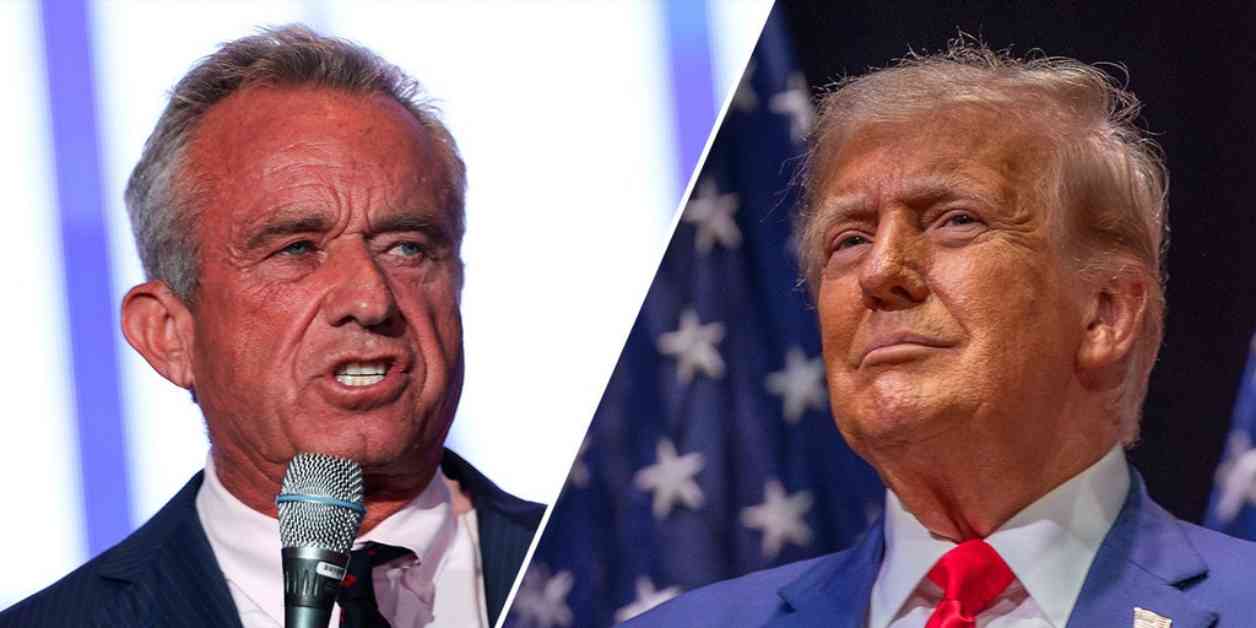Former President Trump is once again at the center of speculation, this time over a potential endorsement from Robert F. Kennedy Jr. following his expected suspension of his presidential campaign. The Democratic National Committee (DNC) has preemptively launched a campaign targeting Trump over the rumored endorsement, calling it “weird as hell.” This move comes as Kennedy’s presidential campaign announced an address to the nation in Arizona, where Trump is scheduled to hold a rally with a “special guest.”
The DNC has unveiled four billboards in battleground states Arizona and Illinois, featuring photos of Trump, his running mate Sen. JD Vance, R-Ohio, and Kennedy. One of the billboards will be located at Chicago’s Trump International Hotel, strategically placed for departing convention attendees to see. This paid advertising campaign marks the DNC’s first featuring Kennedy since President Biden’s suspension of his re-election bid.
Ramsey Reid, who oversees the DNC’s effort against third-party candidates, expressed confidence that their efforts against Kennedy have been successful, noting a decline in his favorability throughout the campaign. Reid emphasized that as voters learned more about Kennedy’s background, ties to MAGA donors, and positions on key issues like abortion bans and January 6th pardons, his support dwindled significantly. The DNC’s data suggests that Kennedy’s remaining support is soft, split across ideologies, and concentrated among lower propensity voters, making him a negligible factor in the race.
Reid also warned that if Trump were to accept Kennedy’s endorsement, he would be taking on all of Kennedy’s baggage, potentially having to appoint him to a significant role in his government. However, both the Trump and Kennedy campaigns have remained silent on the speculation, refusing to provide comment to Fox News Digital at this time.
In a recent Fox News Poll, Trump narrowly defeated Vice President Kamala Harris in a head-to-head match-up, but when third-party candidates like Kennedy were included, the race was tied nationally. Kennedy garnered 6% support in the poll, indicating a potential impact on the outcome of the election. The uncertainty surrounding Kennedy’s next move, whether he will drop out of the race or endorse Trump, adds a layer of intrigue to the evolving political landscape.
With the 2024 campaign trail heating up, the dynamics between key players like Trump, Kennedy, and Harris continue to shift. As the race for the presidency intensifies, the significance of endorsements and alliances becomes increasingly crucial. The potential implications of a Trump-Kennedy partnership are still unclear, but one thing is certain: the drama and suspense of the political arena are far from over.
Speculation Surrounding Trump’s Potential Endorsement from RFK Jr.
The rumors swirling around a possible endorsement from Robert F. Kennedy Jr. have sparked controversy and debate within political circles. The DNC’s preemptive attack on Trump over the speculated endorsement underscores the gravity of this development. Kennedy, known for his environmental activism and advocacy, has been a polarizing figure in American politics, with a loyal following and vocal critics.
As the DNC launches a targeted campaign against Trump and Kennedy, the stakes are high for both parties. The potential impact of Kennedy’s endorsement on the outcome of the election cannot be underestimated. With Trump’s rally in Arizona looming and Kennedy’s address to the nation on the horizon, all eyes are on the evolving dynamics between these two influential figures.
The decision to unveil billboards in key battleground states like Arizona and Illinois reflects the DNC’s strategic approach to countering the potential threat posed by a Trump-Kennedy alliance. By highlighting Kennedy’s ties to MAGA donors and controversial positions on key issues, the DNC aims to erode his support and neutralize any advantage he may bring to Trump’s campaign.
The DNC’s Campaign Strategy and Response to Kennedy’s Campaign
Ramsey Reid’s memo detailing the DNC’s efforts against Kennedy sheds light on the party’s targeted approach to undermining his candidacy. By exposing Kennedy’s “unsavory and reckless past,” as well as his alignment with MAGA donors, the DNC aims to sway voters away from supporting him. Reid’s assertion that Kennedy’s support has dwindled significantly as voters become more informed about his background underscores the effectiveness of the DNC’s campaign strategy.
The decision to launch billboards in Arizona and Illinois, strategically placed to reach convention attendees and rally participants, demonstrates the DNC’s commitment to countering the potential impact of a Trump-Kennedy endorsement. By highlighting Kennedy’s vulnerabilities and tying him to Trump and Vance, the DNC aims to weaken the perceived alliance between these figures and erode their support among voters.
Reid’s emphasis on the importance of neutralizing Kennedy’s threat to Vice President Harris underscores the DNC’s strategic goal of minimizing any advantage Trump may gain from a potential endorsement. By highlighting Kennedy’s weaknesses and negative attributes, the DNC seeks to position him as a liability rather than an asset to Trump’s campaign.
The Potential Impact of Kennedy’s Endorsement on the 2024 Election
As the 2024 election approaches, the significance of endorsements and alliances between key political figures like Trump and Kennedy cannot be overstated. The potential impact of Kennedy’s endorsement on the outcome of the election could shift the dynamics of the race significantly. With Kennedy’s support potentially swaying voters in key battleground states, his decision to endorse Trump or remain neutral could have far-reaching consequences.
The uncertainty surrounding Kennedy’s next move, whether he will drop out of the race or endorse Trump, adds a layer of intrigue to the unfolding political drama. The implications of a Trump-Kennedy alliance, if it materializes, remain uncertain, but one thing is clear: the outcome of the 2024 election hangs in the balance. As the race intensifies and alliances form, the role of endorsements and partnerships will continue to shape the landscape of American politics.




